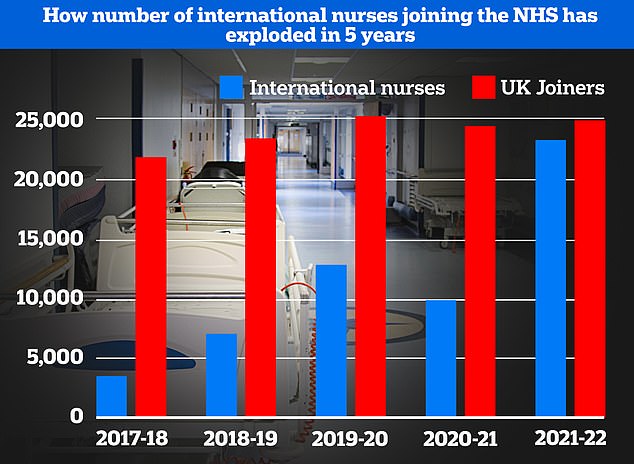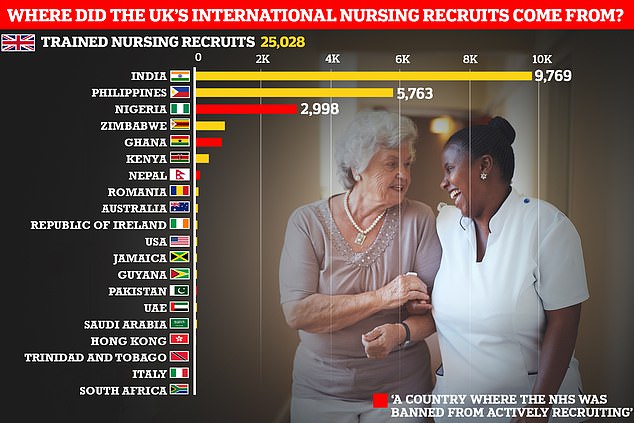Dozens of nurses and midwives from Nigeria STILL working in the UK despite fears their medical exam results are ‘fraudulent or incorrect’
Nearly 50 foreign-trained nurses and midwives in Britain who were ‘likely’ to have been fraudulently qualified are still allowed to treat patients while an investigation is underway, MailOnline can reveal.
The Nursing and Midwifery Council (NMC) today confirmed that 48 Nigerian professionals are suspected of paying someone to take a computer-based exam testing medical knowledge required to work in Britain.
The NMC said it was “more likely than not” that those it identified obtained their results fraudulently.
However, the regulator told MailOnline that they are still allowed to treat patients while investigations are ongoing – although not everyone is necessarily in healthcare.
Think tanks today slammed the decision, saying the regulator has a ‘duty to protect patients’ and that their decision could lead to ‘incompetent individuals threatening the health of adults and newborns’.
Think tanks today criticized the UK’s nursing and midwifery regulator for allowing 48 nurses strongly suspected of fraudulently gaining their qualifications to continue working with patients in Britain while investigations are ongoing ( stock image)
The 48 identified individuals took the exam, which involves drug dosage calculations and clinical questions for health conditions such as diabetes, at the Yunnik Technologies Test Center in Ibadan, southwestern Nigeria.
An investigation by the NMC found ‘evidence of widespread fraudulent activity’ at the centre, meaning any test results it issued are now considered invalid.
Although there were initial doubts about the 515 nurses and midwives tested at the centre, the NMC narrowed the list of ‘likely’ fraudulent applicants to 48.
These nurses and midwives will have their cases assessed by an independently appointed panel to decide whether they have fraudulently accessed the NMC register.
If the panel finds this to be the case, they will be removed from the register and lose the right to work as a nurse or midwife in Britain.
But during this process they will still be allowed to work in Britain without restrictions.
However, those approved by the panel, and the 467 other nurses and midwives from Nigeria who took the test at the centre, will have to successfully resit the test to continue working in healthcare in Britain.
Professor Len Shackleton, editor and research fellow at the Institute for Economic Affairs, told MailOnline it was unacceptable for health professionals with questionable qualifications to continue treating patients.
He said: ‘There are questions about remote testing centers in many academic disciplines – but it is particularly worrying to see this in nursing and midwifery, where incompetent individuals threaten the health of adults and newborns.
‘No one wants individuals who may be innocent to be automatically punished, but the nursing regulator has a duty to protect patients, and the sensitivities of those whose qualifications are questionable must come second to this duty.’
Professor Shackleton added that the situation showed the dangers of Britain’s over-reliance on supervision-trained nurses to fill staff shortages in the NHS.
“This episode should also prompt the British government to fund the training of more of our own medical staff rather than relying on the endless importation of doctors and nurses from poorer countries,” he said.
It is not known what proportion of the 48 suspected nurses and midwives are currently working in health or social care in Britain and in what areas.
It is also believed that a further 669 nurses and midwives who are in the process of working in Britain but have not yet been employed have obtained their results fraudulently.
The NMC said these individuals will have to take another test and will also have to pass a character assessment process.
Another 771 Nigerian applicants cleared of fraud and dishonesty will also have to retake the exam as all results at the center will be declared invalid.
NMC chief executive Andrea Sutcliffe said she was sympathetic to the innocent applicants caught up in the fraud scandal.
“We understand that this remains an unsettling time for people facing uncertainty about their application or place on our register,” she said.
“We are committed to addressing these issues in the safest and fairest way possible.
‘It was essential to look carefully at all the data and other information presented to us before deciding on the appropriate and proportionate approach for all.’

Data from nursing regulator the Nursing and Midwifery Council shows Britain is increasingly turning to international recruits to boost its workforce. This year the number of international nurse recruits almost equaled the number of British nurses joining the profession for the first time ever. The data also shows that the number of internationally trained nurses signing up in Britain has increased year on year, minus a moment of the Covid pandemic hampering immigration.

Nursing in Britain is also becoming increasingly dependent on international recruits, with India and the Philippines accounting for the lion’s share of international nursing recruits, with more than 15,000 between them. Worryingly, a fifth of international nurses in Britain come from red list countries, where the NHS is banned from poaching nurses. These countries were Nigeria, Ghana, Nepal and Pakistan. This data covers the period before Britain struck a special deal with Nepal to allow the NHS to recruit nurses from the country, despite its red list status.
She added that the NMC’s priority remained to protect the public.
“Our paramount concern remains protecting the public by maintaining the integrity of the register for nurses and midwives practicing in Britain,” she said.
“That’s why we responded to this situation with such care and attention.”
The computer test is conducted by a company called Pearson VUE.
Vice President of Europe, Middle East, Africa and Asia Matthew Poyiadgi said the company was taking steps to prevent similar fraud in the future.
“For all testing companies, threats to testing integrity are evolving rapidly and attempts at proxy testing are an unfortunate, periodic occurrence,” he said.
‘We carry out regular security checks at all our testing sites and use advanced technologies to detect any form of fraudulent activity.’
Before testing was suspended, about five percent of all Nigerian professionals on the NMC register took their exam at the Yunnik Technologies Test Center.
There are currently 10,639 Nigerian trained nurses and midwives registered to work in Britain.
This makes them the third largest group of internationally trained nurses and midwives, after India and the Philippines.
The UK’s recruitment of Nigerian health workers is controversial.
Nigeria is considered a ‘red list’ country for healthcare worker recruitment, meaning that poaching of staff could jeopardize its own health and care system.
Although the NHS is banned from recruiting staff directly from red list countries, this does not stop individual medics from applying for jobs in Britain.
Experts have repeatedly raised the alarm about Britain’s increasing reliance on recruiting staff from other countries to fill staff shortages in the NHS and social care.
They have warned that such tactics will leave Britain increasingly in competition with other countries such as Australia and the US, which are also seeking a limited supply of global nurses.
